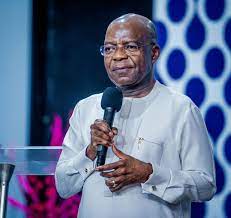Deputy Speaker of the House of Representatives, Benjamin Kalu, has called on Nigerian youths to rise and take the lead in shaping the nation’s democracy through digital innovation, civic engagement, and active political participation ahead of the 2027 general elections.
Speaking at the 2025 CiTech Summit organised by the National Institute for Legislative and Democratic Studies (NILDS) in commemoration of the 10th anniversary of World Youth Skills Day, Kalu said the future of Nigeria’s democracy lies in the hands of its young people. He emphasised that digital skills and artificial intelligence (AI) hold the key to inclusive governance and sustainable national development.
Highlighting the theme of the summit, “The Road to 2027: Leveraging AI and Digital Innovation to Deepen Citizen Participation and Inclusive Governance,” Kalu said Nigeria must use technology as a tool to empower its citizens and bridge the country’s growing digital divide.
He revealed that despite Nigeria’s impressive digital statistics — with over 103 million internet users and 205 million active mobile connections, covering about 90 percent of the population — the country still faces significant digital inequality. Only 45.5 percent of Nigerians have internet access, while rural access remains as low as 23 percent.
“This defines our 2027 challenge,” Kalu said. “How do we build an inclusive, digitally enabled democracy when more than half of our citizens remain digitally excluded? The road to 2027 is not paved with wishful thinking but with strategic action, institutional reform, and collective commitment.”
He noted that the National Assembly is working to create a more enabling environment for young Nigerians by reviewing legislative frameworks that would reduce financial barriers to political participation and enhance youth representation in political structures.
Kalu encouraged youths to take ownership of their country’s democratic journey by using technology for social impact. “Use digital platforms not just for consumption but for creation. Build civic tech tools that track government projects, monitor budgets, and expose corruption. Use your voices not just to criticise, but to propose solutions, contest elections, and support leaders who share your values,” he said.
Director-General of NILDS, Professor Abubakar Sulaiman, also urged Nigerian youths to think creatively about how technology can drive inclusion and accountability in governance. He emphasised that the strength of Nigeria’s democracy depends on the energy, innovation, and commitment of its young population.
“The future of our democracy depends on young people — their ideas, their courage, and their vision. Together, we must build a democratic system that is both inclusive and forward-looking,” he said.
Yusuf Laidi, founder of ILEAD Africa, echoed similar sentiments, urging young people to use innovation to rebuild public trust in governance. “As the 2027 elections approach, we must turn technology into a tool for transparency and accountability. Governance must reflect the true voices and aspirations of the people,” he said.
The summit served as a powerful call to action, encouraging Nigerian youths to transform their digital potential into political influence and drive the nation toward a more inclusive, transparent, and technology-driven democratic future.













Leave a comment